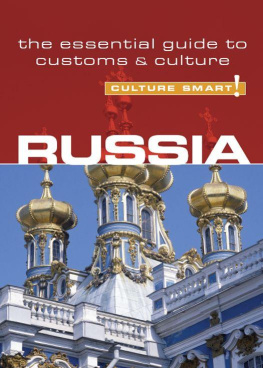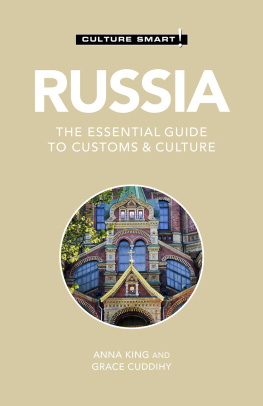First published in Great Britain 2007
by Kuperard, an imprint of Bravo Ltd
59 Hutton Grove, London N12 8DS
Tel: +44 (0) 20 8446 2440 Fax: +44 (0) 20 8446 2441
www.culturesmartguides.com
Inquiries:
Culture Smart! is a registered trademark of Bravo Ltd
Distributed in the United States and Canada
by Random House Distribution Services
1745 Broadway, New York, NY 10019
Tel: +1 (212) 572-2844 Fax: +1 (212) 572-4961
Inquiries:
Copyright 2007 Kuperard
Revised 2008; third printing
All rights reserved. No part of this publication may be reprinted or reproduced, stored in a retrieval system, or transmitted in any form or by any means without prior permission in writing from the publishers.
Series Editor Geoffrey Chesler
eISBN: 978-1-85733-574-3
British Library Cataloguing in Publication Data
A CIP catalogue entry for this book is available from the British Library
Cover image: Catherine Palace, Pushkin, St. Petersburg.
Travel Ink / Philip Craven
v3.1
About the Author
ANNA KING is a Russian-born business development consultant specializing in cross-cultural issues, negotiation practices, and conflict management. She speaks seven languages, and has an M. Phil. degree from Cambridge University. Anna has worked with key government and decision makers in Britain and across the CIS. She has also interpreted for high-level government visits to the UK and for senior ministerial meetings at the EU in Brussels. Having worked in business development for a number of years for two major British corporations, she is now managing director of the British-based consultancy 3C Negotiations, and is the author of numerous articles and two books on cross-cultural communication.
The Culture Smart! series is continuing to expand.
For further information and latest titles visit
www.culturesmartguides.com
The publishers would like to thank CultureSmart!Consulting for its help in researching and developing the concept for this series.
CultureSmart!Consulting creates tailor-made seminars and consultancy programs to meet a wide range of corporate, public-sector, and individual needs. Whether delivering courses on multicultural team building in the USA, preparing Chinese engineers for a posting in Europe, training call-center staff in India, or raising the awareness of police forces to the needs of diverse ethnic communities, it provides essential, practical, and powerful skills worldwide to an increasingly international workforce.
For details, visit www.culturesmartconsulting.com
CultureSmart!Consulting and CultureSmart! guides have both contributed to and featured regularly in the weekly travel program Fast Track on BBC World TV.
contents
Map of Russia

introduction
Russia is the largest country in the world, and one of the most enigmatic, complex, and difficult countries to write about. Several stereotypical impressions of Russia are imprinted on our psychebe it an unsmiling babushka in a thin, shabby coat and headscarf or a glamorous model swathed in furs; the echoing crunch of boots on parade in Red Square, or the featherlight grace of ballerinas in Tchaikovskys Nutcracker; the gold Rolex of a nouveau riche, or the shining domes of the Sergiyev Posad Lavra.
Everything in Russia is about contradictions, from its Eurasian geographical position and extremes of climate to its changing economic regimes and conflicting modern values.
Russias military and political power, as well as the rich contribution of its art and culture, are the result of an inner dynamic not always understood by outsiders. The Russian language and the Russian Orthodox religion are unique; Russian history is tragic; and the people are unpredictable.
It would, of course, be wrong to generalize or to try to pack 141 million people into a single box, extending from Europe to the Pacific. The Muscovite will not behave in the same way as the Kazakh from the southern region of Kuban, the hunter from the far north as the plant worker in the Urals. And yet politicians, writers, and philosophers keep returning to the enigma of the Russian soul, and referring to the uniquely Russian way of behavior and development. Despite the undoubted regional differences there is a shared base of history, tradition, and values.
Travelers to Russia seek answers to the same questions: What should I expect? How do I make friends? Are there any particular ways of conducting business? This completely revised edition of Culture Smart! Russia sets out to help you become a more perceptive and tolerant traveler, and to make your trip more personally fulfilling. It explores the connections between Russias turbulent past and its paradoxical present. Using illustrative anecdotes it describes present-day values and attitudes, and offers practical advice on what to expect and how to behave in different social circumstances. It aims to reintroduce the Russian people to you, their generous qualities of character, what they believe, aspire to, and feel, how they entertain, and how they conduct business. If your curiosity extends beyond matryoshka, troika, and balalaika, this book is for you. Dobro pozhalovat!
Key Facts
| Official Name | The Russian Federation(RossiyskayaFederatsiya) | Russia is negotiating membership of the World Trade Organization. |
| Capital City | Moscow | Population 10.4 million |
| Major Cities | St. Petersburg (second city); population approx. 4 million | Nizhny Novgorod, Samara, Kazan, Perm, Ufa, Rostov-on-Don, Volgograd, and Novosibirsk. |
| Area | 6,592,800 sq. miles (17,075,400 sq. km) | The biggest country in the world; about one-ninth of the worlds total area. |
| Borders | Norway, Finland, Estonia, Latvia, Belarus, Ukraine, Georgia, Azerbaijan, Kazakhstan, Mongolia, China, and North Korea. | Several former member states of the USSR are no longer contiguous. |
| Climate | Varies enormously across the huge land area, from the Arctic north to the southerly latitudes of the Black Sea and the moderating maritime influences in the west. | Broadly speaking there is a long cold winter with snow and ice from November to April, a spring thaw from April and May, and a hot summer from June till September. |
| Time Zones | Russia covers 11 time zones. | Moscow and St. Petersburg are 3 hours ahead of GMT and 8 hours ahead of New York. |
| Currency | Ruble = 100 kopeks |
| Population | Recent estimates give around 142 million, 75% of whom live in cities. | Three quarters of the population live in European Russia. |
| Ethnic Makeup | 81% of the population is Slav, but there are significant minorities. | Minorities incl. Tatars, Ukrainians, Chuvash, Belarussians, Bashkirs, Chechens. |
| Language | Russian | Other languages also spoken in the autonomous republics. |
|





